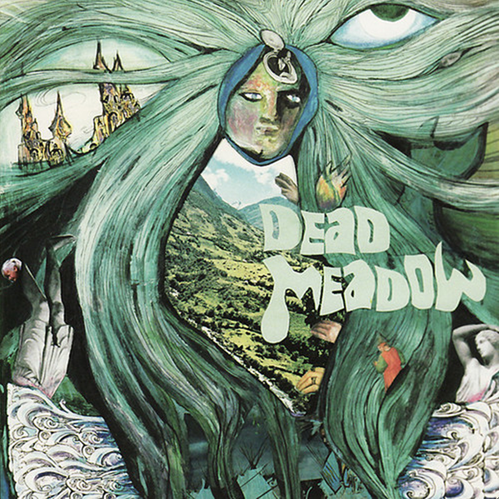Looking back on it now, it is surely reasonable to suggest that few first-tracks-on-first-albums sum up the powers and style of a band as well as ‘Sleepy Silver Door’ from Dead Meadow’s debut, released an astonishing 13 years ago. After a simple stoner-ish riff Jason Simon’s effects-laden Les Paul hits a propulsive one-note line after exactly 43 seconds, a thumping groove that feels like it has barely stopped since for the three-piece. It not only set the tone for this album, but also Dead Meadow’s ensuing years of sizzling blues-influenced electric noise.
Dead Meadow’s debut came out long before their songs appeared on The Wire (Simon being creator David Simon’s nephew), they secured a strong European following thanks to some seismic festival sets and they relocated from their native Washington DC to Los Angeles. The record also featured original drummer Mark Laughlin, who left in 2002 only to return in 2010, apparently having had enough of being a lawyer. Once out of print, this album also received a low-key reissue in 2006, with this latest version coming just months out from the long-awaited new album from the band. And while this is far from their best record, a reappraisal of the raw and unkempt Dead Meadow does act as opportunity to experience the band’s original raison d’etre, as well as an example of Hawkwind-inspired psych-rock before it managed to become so visibly in vogue in the mid-00s.
That DC factor is not insignificant. The album’s original release came on Fugazi drummer Joe Lally’s label Tolotta Records, with there a much more prevalent fogginess to this than on future releases, perhaps in part to Dead Meadow emerging from the outer reaches of the famous DC experimental rock community in the 90s. This is most obvious on the feverish ‘Indian Bones’, which has certain shades of Fugazi’s 13 Songs about it.
That punk element has largely been kneaded out of their sound since 2000, and indeed is only really explicit on the one track here. Otherwise, ‘Dragonfly’ shows the hazy, meandering jamming the band have perfected, while hints at more melodic folk-rock can be found with ‘Greensky Greenlake’ and ‘At The Edge of the Wood’.
Such songs prove that many aspects of early Dead Meadow still strongly endure. Yet the album also shows how far they have come in the last decade and improved upon things that were slightly shaky on their opening salvo. Simon’s vocals, for example, are generally deliberately totally lost in the dirge, and when more naked, such as ‘At The Edge of the Wood’ seem gratingly out of tune. His singing has blossomed to the degree that his nasal trill is not only a centrepiece of Dead Meadow’s last two albums Old Growth and Three Kings, but also to the fore on his excellent 2011 solo album.
In addition, this primitive record offers substantially less variety than, say, Old Growth. There is little straying from the guitar-bass-drums formula that is augmented by more exotic instrumental choices on future LPs, the result of Simon and the band’s natural musical curiosity taking in different cultures as well as, arguably, the band’s increased mind-expanding drug use in the following years. Let’s also not forget that this album was limited by its recording taking place in Simon’s parents’ basement.
Dead Meadow also stands as an important marker for how far bass player Steve Kille has travelled since then. His development, from monotonous timekeeper here to the head-banging, R&B-influenced hero of today is as important as any of Simon’s contributions.
The album’s most satisfying tracks must be the well-known jam ‘Beyond The Fields We Know’ (the soundtrack to McNulty’s failed attempts at bonding with his sons in The Wire‘s season five), and the terrific ‘Rocky Mountain High’, which manages to combine that DC punk ethic with Simon’s beloved Hendrix-isms. This reissue, tenderly remixed and remastered, features one bonus track, the brief but attractively funky ‘Spanish Girl Reprise’, a mellow addendum to an album that sparkles with both its aggressive volume, and the glimmers of what heady avenues this band would later explore.


